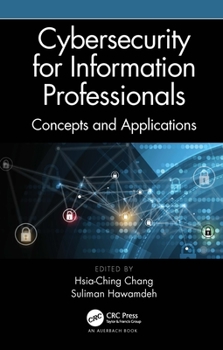Cybersecurity for Information Professionals: Concepts and Applications
Information professionals have been paying more attention and putting a greater focus on privacy over cybersecurity. However, the number of both cybersecurity and privacy breach incidents are soaring, which indicates that cybersecurity risks are high and growing. Utilizing cybersecurity awareness training in organizations has been an effective tool to promote a cybersecurity-conscious culture, making individuals more cybersecurity-conscious as well. However, it is unknown if employees' security behavior at work can be extended to their security behavior at home and personal life. On the one hand, information professionals need to inherit their role as data and information gatekeepers to safeguard data and information assets. On the other hand, information professionals can aid in enabling effective information access and dissemination of cybersecurity knowledge to make users conscious about the cybersecurity and privacy risks that are often hidden in the cyber universe.
Cybersecurity for Information Professionals: Concepts and Applications introduces fundamental concepts in cybersecurity and addresses some of the challenges faced by information professionals, librarians, archivists, record managers, students, and professionals in related disciplines. This book is written especially for educators preparing courses in information security, cybersecurity, and the integration of privacy and cybersecurity. The chapters contained in this book present multiple and diverse perspectives from professionals in the field of cybersecurity. They cover such topics as:
Information governance and cybersecurity User privacy and security online and the role of information professionals Cybersecurity and social media Healthcare regulations, threats, and their impact on cybersecurity A socio-technical perspective on mobile cybersecurity Cybersecurity in the software development life cycle Data security and privacyAbove all, the book addresses the ongoing challenges of cybersecurity. In particular, it explains how information professionals can contribute to long-term workforce development by designing and leading cybersecurity awareness campaigns or cybersecurity hygiene programs to change people's security behavior.





